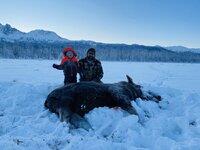V2Pnutrition
WKR
We shot a cow a couple of years ago with temps around -8-10F (-22C). We skinned, quartered, and packed it off the mountain like any other animal. It froze solid that night. I unthawed it when home to process myself and never had a better tasting elk the rest of that year.
What I would change is removing the game bags earlier if I had a way to keep the meat clean once back at the truck. It tore a couple of my bags because I tried to peel them back too soon. 100% on me…
What I would change is removing the game bags earlier if I had a way to keep the meat clean once back at the truck. It tore a couple of my bags because I tried to peel them back too soon. 100% on me…

